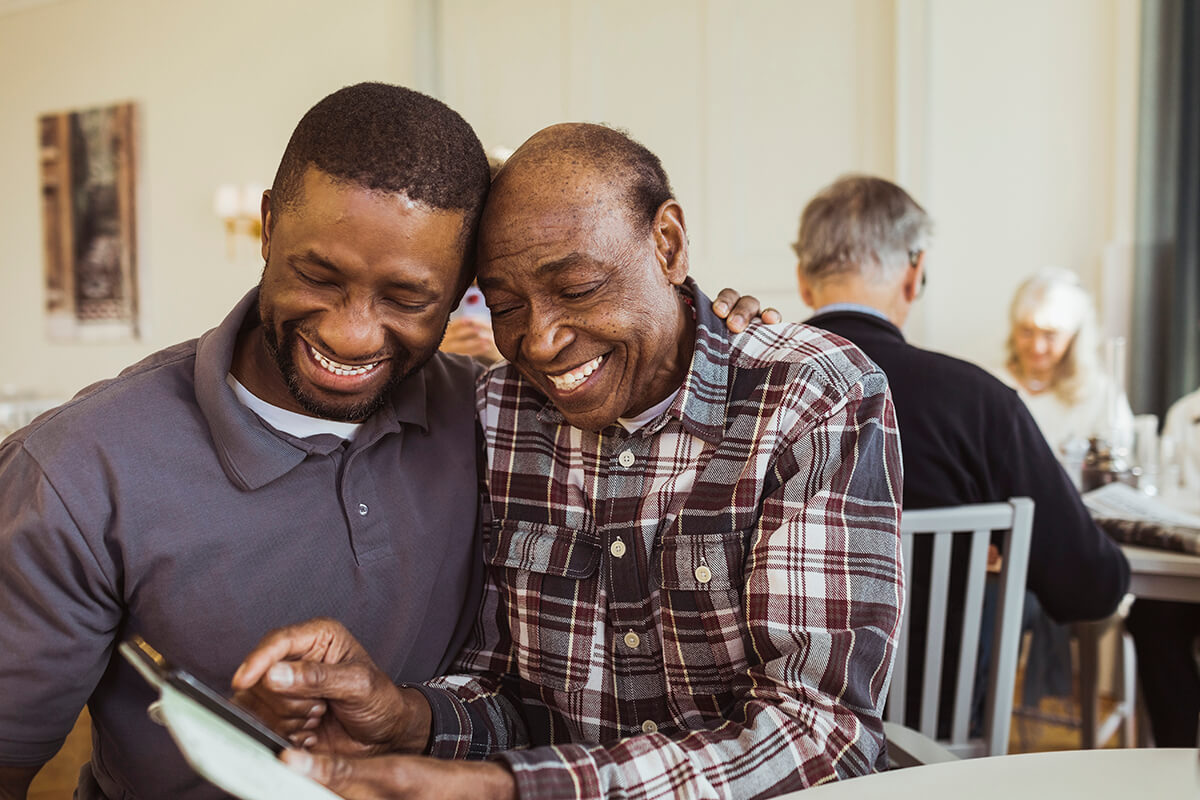Help a loved one adjust to elder care facility

Is it time for assisted living? As your loved one gets older, this is a question many caregivers may ask. It’s a common transition for older people. There are 1.2 million American adults over the age of 65 who live in a nursing home.1 Another 800,000 people live in assisted living facilities. This means they still live independently, but need help with daily activities like bathing or getting around.2
If you have a parent or other loved one who may need to move into an elder care facility, it can be emotional. It can also involve a lot of decision-making and planning.
“It can be a real adjustment — both for your loved one, and for you, as the caregiver,” says Alyssa M. Lanzi, Ph.D., a research assistant professor and executive committee member of the Delaware Center for Cognitive Aging Research at the University of Delaware in Newark.
The process can be complex, but there are ways to help smooth the transition. Consider these 6 tips from caregiving experts.
1. Introduce the idea early
“Ideally, you want to bring up the concept of assisted living while your loved one is still able to live independently,” says Lanzi. “You don’t want to wait until something bad happens, like them having a fall, and then have to have a conversation as they’re transitioning.”
It’s best to sit down with your loved one for this conversation months — or even years — before they might need to move into an elder care facility. The goal is to get a sense of where they might want to live (and what they can afford) if it becomes a necessity.
Be prepared to address your loved one’s fears and concerns. “Many older adults hear the words ‘assisted living’ and assume it means that they’ll be locked up and unable to leave,” Lanzi says. Your loved one may also express feelings of resentment if they had expected an offer to live with a family member. This big life change will come with many different emotional reactions. Be patient as you begin these conversations.
2. Take the journey together
It’s a good idea to go on tours of several facilities that are within your loved one’s budget after you’ve had that first discussion. This will help your parent or loved one realize that moving to assisted living doesn’t mean losing their freedom.
Visiting the chosen facility together before your loved one moves in can help them get more comfortable, explains Megan Carnarius, R.N., founder of Memory Care Consulting in Boulder, Colorado. Check out a special event the facility is hosting or go there to simply have a meal together.
“Gradually increase time to allow them to become more familiar,” Carnarius advises. If possible, see if you can do what’s called a ‘respite stay,’ where they sleep at the facility overnight. “The staff can respond in a welcoming, excited way to them staying overnight, so that it’s a bit of a warmup,” she explains.
3. Do the packing with them
Chances are, your loved one is living with years of cherished items. It may be hard for them to figure out what they want to bring with them.
Help your loved one sort through their items. You can separate them into 3 categories, suggests Diane Carbo, R.N., a caregiver coach in Myrtle Beach, South Carolina. These include:
- What they want to keep
- What’s sentimental and should go to family members
- What can be donated or thrown away
If possible, try to bring a couple pieces of furniture that have sentimental value. That might be a favorite comfy chair or a specific cabinet that’s been in the family for decades, explains Carnarius. Photos of loved ones — like beloved grandchildren — are also a must.
4. Create a communication schedule
A schedule will help set clear expectations about when you’ll be in touch, notes Lanzi. “Have specific times when you call and visit. For example, you could call every morning at 9 a.m., and visit on Tuesday and Wednesday afternoons,” she says.
Write down the schedule for your loved one. It also helps to record a message on their phone or tablet. In the message, tell them when you’re scheduled to visit so the staff can play it for them if they get confused or forget. “You want to play a supporting role, but not a primary one,” stresses Lanzi.
During the first few months of your loved one’s transition, ask friends and family to make an extra effort to call and visit them on a regular basis. Even if it’s a 20-minute virtual call, having time to connect with familiar faces may help your loved one settle into their new space.
5. Help facilitate new relationships
If your loved one isn’t great at meeting people, consider helping them out. In all of life's stages, there will be social people, including in elder care facilities. Seek out this type of person — and let them know your loved one is new there and open to meeting people.
“Oftentimes, the facility has residents who act as ambassadors, which is a lovely way to meet people,” says Carnarius. If the facility has an adult day program, you may want to consider having your loved one attend a few times, so they can get to know other residents.
Encourage your loved one to get involved in events and activities as much as possible. Even if they‘re limited in certain ways, there are things they can do to give themselves a sense of purpose, like offering to help staff with simple chores. “Everyone needs to feel busy and active, even if it’s just folding towels with the nurses,” says Carbo.
You may also want to get in touch with the facility’s activities director to let them know what kind of hobbies your loved one likes. That way, the facility’s staff can encourage your loved one to join certain activities they know they’ll enjoy.
6. Be prepared for ongoing questions and conversations
If you have children, you may have received homesick letters from them at summer camp, asking to come home. Prepare yourself for the same kind of communication from your older loved one. Reminding them all the ways this change is benefiting their health and wellbeing may help make the transition easier. For example, you might explain they need rehab to improve strength and balance, or to recover from an injury. If your loved one knows they need help, they may be more open-minded about this change.
However, they may not have that insight, or may not realize how much is being done for them. And they might disagree when you try to point it out. If that’s the case, it’s better to have a reason that isn’t just between the 2 of you, notes Carnarius.
You can remind them why their provider believes it’s important to make this move. (Or better yet, have their provider tell your loved one themselves during an appointment.) Many older adults respect and trust their provider’s opinion. Knowing their doctor recommends this shift could help lessen feelings of resentment toward family members.
If loved one calls saying they don’t like it at the facility, you may feel some caregiving guilt. Know that this is normal. In these moments, it’s important to remember that your loved one is there so they can receive the care they need.
The bottom line: When a parent or loved one is entering an elder care facility, there will be an adjustment period. It can feel unsettling for both of you. It may take some time, but hopefully once they grow more comfortable and meet new people, they’ll be able to thrive in their new living arrangements.
